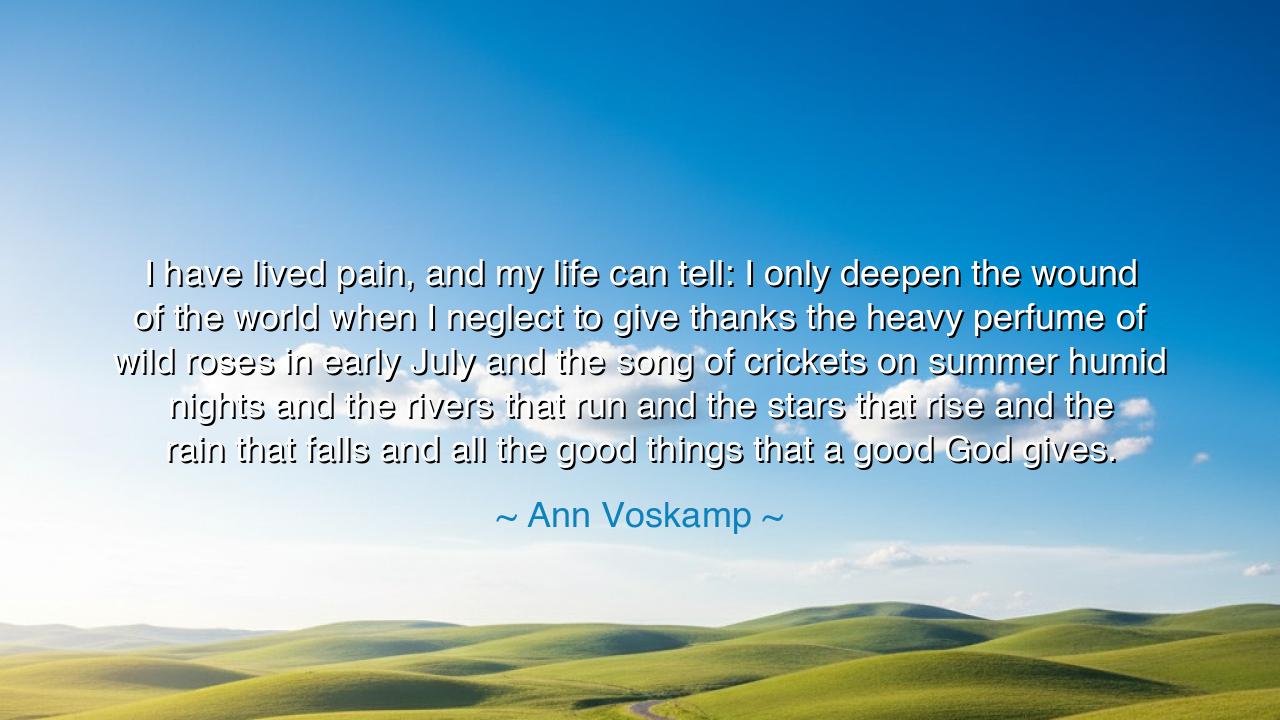
I have lived pain, and my life can tell: I only deepen the wound
I have lived pain, and my life can tell: I only deepen the wound of the world when I neglect to give thanks the heavy perfume of wild roses in early July and the song of crickets on summer humid nights and the rivers that run and the stars that rise and the rain that falls and all the good things that a good God gives.






Hearken, children of the ages, and attend to the words of Ann Voskamp, who speaks from the crucible of experience and the clarity of gratitude: "I have lived pain, and my life can tell: I only deepen the wound of the world when I neglect to give thanks the heavy perfume of wild roses in early July and the song of crickets on summer humid nights and the rivers that run and the stars that rise and the rain that falls and all the good things that a good God gives." Here lies a meditation upon the interweaving of suffering, awareness, and the sacred duty of thankfulness.
Voskamp reminds us that life is a tapestry of both pain and beauty, and that to witness the gifts of creation without gratitude is to compound the suffering of the world. The heavy perfume of wild roses, the nocturnal song of crickets, the flowing rivers, the rising stars, and the falling rain are not mere adornments of life—they are blessings, evidence of a benevolent order, and reminders of the divine generosity that suffuses existence even amid hardship. Gratitude, she teaches, is a balm not only for the soul but for the world itself.
Consider the example of Helen Keller, who endured darkness and silence yet cultivated profound appreciation for the world she could perceive. Though beset by limitations and trials, Keller found joy in the touch of water, the warmth of the sun, and the rhythm of the natural world. Her recognition of the smallest wonders mirrors Voskamp’s insight: acknowledgment and gratitude amplify the goodness present in the universe, and to neglect it is to deepen the shadows in one’s own heart.
The imagery of summer nights, wild roses, and flowing rivers is not merely poetic; it signifies the attention to life’s minutiae that nourishes the soul. Voskamp teaches that wonder is not found solely in grand achievements or monumental sights, but in the ordinary miracles that unfold each day. To witness the world fully, even amidst suffering, is to participate in a sacred act of recognition, a form of resistance against despair and ingratitude.
Voskamp’s reflection also speaks to the moral imperative of thankfulness. The human spirit, when attentive and reverent, does not merely survive pain—it transforms it. To acknowledge the blessings in one’s life, despite wounds endured, is to contribute light, healing, and hope to the world. Historical figures such as Dietrich Bonhoeffer, imprisoned yet steadfast in faith, exemplified this principle: even amid oppression, he recognized and expressed gratitude for the goodness and beauty that remained, sustaining both himself and others.
The lesson is profound: cultivate awareness, gratitude, and attentiveness. Recognize the gifts that exist in the everyday: the smell of flowers, the song of creatures, the flow of water, the dance of stars, and the blessing of rain. Life, in all its complexity, pain, and beauty, calls for acknowledgment and reverence. Neglecting to give thanks diminishes both our own spirit and the vitality we bring to the world.
Practical action follows naturally: pause each day to observe, reflect, and give thanks. Walk in nature, breathe deeply, listen to the night, touch the water, and watch the sky. Record your gratitude, share it with others, and cultivate a habit of recognizing even small wonders. Let your attention to these gifts heal the wounds within and around you, and allow the practice of thanksgiving to deepen your connection to life and the divine.
Thus, Ann Voskamp’s words endure as both admonition and inspiration: even in the midst of pain, the good things of the world demand our recognition, attention, and gratitude. Let all who hear remember that life’s blessings—ordinary, abundant, and sacred—are a call to awareness, and that by giving thanks, we lighten our burdens, enrich our souls, and honor the eternal generosity of creation itself.
If you wish, I can also craft a poetic, audio-ready version of this passage, where the cadence mirrors the unfolding of day and night, summer scents, and the rhythm of nature, enhancing the emotional and reflective power of Voskamp’s insight. Do you want me to do that?






AAdministratorAdministrator
Welcome, honored guests. Please leave a comment, we will respond soon